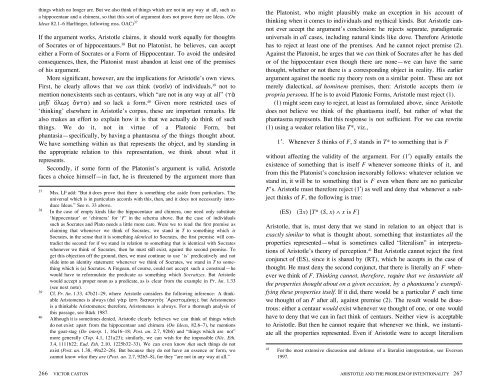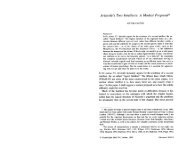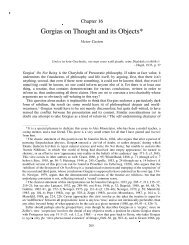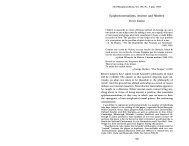Aristotle and the Problem of Intentionality. - Ancient Philosophy ...
Aristotle and the Problem of Intentionality. - Ancient Philosophy ...
Aristotle and the Problem of Intentionality. - Ancient Philosophy ...
Create successful ePaper yourself
Turn your PDF publications into a flip-book with our unique Google optimized e-Paper software.
things which no longer are. But we also think <strong>of</strong> things which are not in any way at all, such asa hippocentaur <strong>and</strong> a chimera, so that this sort <strong>of</strong> argument does not prove <strong>the</strong>re are Ideas. (OnIdeas 82.1–6 Harlfinger, following mss. OAC) 37If <strong>the</strong> argument works, <strong>Aristotle</strong> claims, it should work equally for thoughts<strong>of</strong> Socrates or <strong>of</strong> hippocentaurs. 38 But no Platonist, he believes, can acceptei<strong>the</strong>r a Form <strong>of</strong> Socrates or a Form <strong>of</strong> Hippocentaur. To avoid <strong>the</strong> undesiredconsequences, <strong>the</strong>n, <strong>the</strong> Platonist must ab<strong>and</strong>on at least one <strong>of</strong> <strong>the</strong> premises<strong>of</strong> his argument.More significant, however, are <strong>the</strong> implications for <strong>Aristotle</strong>’s own views.First, he clearly allows that we can think (noe›n) <strong>of</strong> individuals, 39 not tomention nonexistents such as centaurs, which “are not in any way at all” (tåmhdÉ ˜lvw ˆnta) <strong>and</strong> so lack a form. 40 Given more restricted uses <strong>of</strong>‘thinking’ elsewhere in <strong>Aristotle</strong>’s corpus, <strong>the</strong>se are important remarks. Healso makes an effort to explain how it is that we actually do think <strong>of</strong> suchthings. We do it, not in virtue <strong>of</strong> a Platonic Form, butphantasia—specifically, by having a phantasma <strong>of</strong> <strong>the</strong> things thought about.We have something within us that represents <strong>the</strong> object, <strong>and</strong> by st<strong>and</strong>ing in<strong>the</strong> appropriate relation to this representation, we think about what itrepresents.Secondly, if some form <strong>of</strong> <strong>the</strong> Platonist’s argument is valid, <strong>Aristotle</strong>faces a choice himself—in fact, he is threatened by <strong>the</strong> argument more than37 Mss. LF add: “But it does prove that <strong>the</strong>re is something else aside from particulars. Theuniversal which is in particulars accords with this, <strong>the</strong>n, <strong>and</strong> it does not necessarily introduceIdeas.” See n. 33 above.38 In <strong>the</strong> case <strong>of</strong> empty kinds like <strong>the</strong> hippocentaur <strong>and</strong> chimera, one need only substitute‘hippocentaur’ or ‘chimera’ for ‘F’ in <strong>the</strong> schema above. But <strong>the</strong> case <strong>of</strong> individualssuch as Socrates <strong>and</strong> Plato needs a little more care. Were we to read <strong>the</strong> first premise asclaiming that whenever we think <strong>of</strong> Socrates, we st<strong>and</strong> in T to something which isSocrates, in <strong>the</strong> sense that it is something identical to Socrates, <strong>the</strong> first premise will contradict<strong>the</strong> second: for if we st<strong>and</strong> in relation to something that is identical with Socrateswhenever we think <strong>of</strong> Socrates, <strong>the</strong>n he must still exist, against <strong>the</strong> second premise. Toget this objection <strong>of</strong>f <strong>the</strong> ground, <strong>the</strong>n, we must continue to use ‘is’ predicatively <strong>and</strong> notslide into an identity statement: whenever we think <strong>of</strong> Socrates, we st<strong>and</strong> in T to somethingwhich is (a) Socrates. A Fregean, <strong>of</strong> course, could not accept such a construal—hewould have to reformulate <strong>the</strong> predicate as something which Socratizes. But <strong>Aristotle</strong>would accept a proper noun as a predicate, as is clear from <strong>the</strong> example in Pr. An. 1.33(see next note).39 Cf. Pr. An. 1.33, 47b21–29, where <strong>Aristotle</strong> considers <strong>the</strong> following inference: A thinkableAristomenes is always (ée‹ går §sti dianohtÚw ÉAristom°nhw); but Aristomenesis a thinkable Aristomenes; <strong>the</strong>refore, Aristomenes is always. For a thorough analysis <strong>of</strong>this passage, see Bäck 1987.40 Although it is sometimes denied, <strong>Aristotle</strong> clearly believes we can think <strong>of</strong> things whichdo not exist: apart from <strong>the</strong> hippocentaur <strong>and</strong> chimera (On Ideas, 82.6–7), he mentions<strong>the</strong> goat-stag (De interp. 1, 16a16–18; Post. an. 2.7, 92b6) <strong>and</strong> “things which are not”more generally (Top. 4.1, 121a23); similarly, we can wish for <strong>the</strong> impossible (Nic. Eth.3.4, 1111b22; Eud. Eth. 2.10, 1225b32–33). We can even know that such things do notexist (Post. an. 1.38, 49a22–26). But because <strong>the</strong>y do not have an essence or form, wecannot know what <strong>the</strong>y are (Post. an. 2.7, 92b5–8), for <strong>the</strong>y “are not in any way at all.”<strong>the</strong> Platonist, who might plausibly make an exception in his account <strong>of</strong>thinking when it comes to individuals <strong>and</strong> mythical kinds. But <strong>Aristotle</strong> cannotever accept <strong>the</strong> argument’s conclusion: he rejects separate, paradigmaticuniversals in all cases, including natural kinds like dove. Therefore <strong>Aristotle</strong>has to reject at least one <strong>of</strong> <strong>the</strong> premises. And he cannot reject premise (2).Against <strong>the</strong> Platonist, he urges that we can think <strong>of</strong> Socrates after he has diedor <strong>of</strong> <strong>the</strong> hippocentaur even though <strong>the</strong>re are none—we can have <strong>the</strong> samethought, whe<strong>the</strong>r or not <strong>the</strong>re is a corresponding object in reality. His earlierargument against <strong>the</strong> noetic ray <strong>the</strong>ory rests on a similar point. These are notmerely dialectical, ad hominem premises, <strong>the</strong>n: <strong>Aristotle</strong> accepts <strong>the</strong>m inpropria persona. If he is to avoid Platonic Forms, <strong>Aristotle</strong> must reject (1).(1) might seem easy to reject, at least as formulated above, since <strong>Aristotle</strong>does not believe we think <strong>of</strong> <strong>the</strong> phantasma itself, but ra<strong>the</strong>r <strong>of</strong> what <strong>the</strong>phantasma represents. But this response is not sufficient. For we can rewrite(1) using a weaker relation like T*, viz.,1′. Whenever S thinks <strong>of</strong> F, S st<strong>and</strong>s in T* to something that is Fwithout affecting <strong>the</strong> validity <strong>of</strong> <strong>the</strong> argument. For (1′) equally entails <strong>the</strong>existence <strong>of</strong> something that is itself F whenever someone thinks <strong>of</strong> it, <strong>and</strong>from this <strong>the</strong> Platonist’s conclusion inexorably follows: whatever relation west<strong>and</strong> in, it will be to something that is F even when <strong>the</strong>re are no particularF’s. <strong>Aristotle</strong> must <strong>the</strong>refore reject (1′) as well <strong>and</strong> deny that whenever a subjectthinks <strong>of</strong> F, <strong>the</strong> following is true:(ES) (∃x) [T* (S, x) ∧ x is F]<strong>Aristotle</strong>, that is, must deny that we st<strong>and</strong> in relation to an object that isexactly similar to what is thought about, something that instantiates all <strong>the</strong>properties represented—what is sometimes called “literalism” in interpretations<strong>of</strong> <strong>Aristotle</strong>’s <strong>the</strong>ory <strong>of</strong> perception. 41 But <strong>Aristotle</strong> cannot reject <strong>the</strong> firstconjunct <strong>of</strong> (ES), since it is shared by (RT), which he accepts in <strong>the</strong> case <strong>of</strong>thought. He must deny <strong>the</strong> second conjunct, that <strong>the</strong>re is literally an F wheneverwe think <strong>of</strong> F. Thinking cannot, <strong>the</strong>refore, require that we instantiate all<strong>the</strong> properties thought about on a given occasion, by a phantasma’s exemplifying<strong>the</strong>se properties itself. If it did, <strong>the</strong>re would be a particular F each timewe thought <strong>of</strong> an F after all, against premise (2). The result would be disastrous:ei<strong>the</strong>r a centaur would exist whenever we thought <strong>of</strong> one, or one wouldhave to deny that we can in fact think <strong>of</strong> centaurs. Nei<strong>the</strong>r view is acceptableto <strong>Aristotle</strong>. But <strong>the</strong>n he cannot require that whenever we think, we instantiateall <strong>the</strong> properties represented. Even if <strong>Aristotle</strong> were to accept literalism41 For <strong>the</strong> most extensive discussion <strong>and</strong> defense <strong>of</strong> a literalist interpretation, see Everson1997.266 VICTOR CASTONARISTOTLE AND THE PROBLEM OF INTENTIONALITY 267





